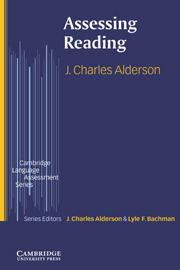Book contents
- Frontmatter
- Contents
- Series Editor's Preface
- Acknowledgements
- Abbreviations
- 1 The nature of reading
- 2 Variables that affect the nature of reading
- 3 Research into the assessment of reading
- 4 The reader: defining the construct of reading ability
- 5 A framework for test design
- 6 Tests in the real world: test purposes
- 7 Techniques for testing reading
- 8 The development of reading ability
- 9 The way forward. Assessing the interation between reader and text: processes and strategies
- Bibliography
- Index
8 - The development of reading ability
Published online by Cambridge University Press: 03 May 2010
- Frontmatter
- Contents
- Series Editor's Preface
- Acknowledgements
- Abbreviations
- 1 The nature of reading
- 2 Variables that affect the nature of reading
- 3 Research into the assessment of reading
- 4 The reader: defining the construct of reading ability
- 5 A framework for test design
- 6 Tests in the real world: test purposes
- 7 Techniques for testing reading
- 8 The development of reading ability
- 9 The way forward. Assessing the interation between reader and text: processes and strategies
- Bibliography
- Index
Summary
Introduction
As we have seen in earlier chapters, researchers into, and testers of, reading, have long been concerned to identify differences between good and poor readers, the successful and the unsuccessful. Much research into reading has investigated reading development: what changes as readers become more proficient, as reading ability develops with age and experience. Theories of reading are frequently based upon such research, although they may not be couched in terms of reading development. Constructs of reading ability can also be expressed in terms of development: what changes in underlying ability as readers become more proficient. In earlier chapters, I have been concerned to explore the constructs of reading that underly test specifications and frameworks for development. In this chapter, I will explore the longitudinal aspect of the construct of reading, by looking at views of how reading ability develops over time.
Testers need to describe to users what those who score highly on a reading test can do that those who score low cannot, to aid score interpretation. In addition, since different reading tests are frequently developed for readers at different stages of development, there is a need for detailed specifications of tests at different levels, to differentiate developing readers. Thus designers of reading tests and assessment procedures have had to operationalise what they mean by reading development.
- Type
- Chapter
- Information
- Assessing Reading , pp. 271 - 302Publisher: Cambridge University PressPrint publication year: 2000



